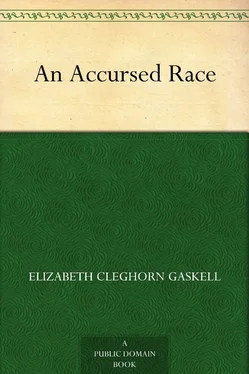Elizabeth Gaskell - An Accursed Race
Здесь есть возможность читать онлайн «Elizabeth Gaskell - An Accursed Race» весь текст электронной книги совершенно бесплатно (целиком полную версию без сокращений). В некоторых случаях можно слушать аудио, скачать через торрент в формате fb2 и присутствует краткое содержание. Год выпуска: 2007, ISBN: 2007, Издательство: Dodo Press, Жанр: Классическая проза, на английском языке. Описание произведения, (предисловие) а так же отзывы посетителей доступны на портале библиотеки ЛибКат.
- Название:An Accursed Race
- Автор:
- Издательство:Dodo Press
- Жанр:
- Год:2007
- ISBN:9781406527933
- Рейтинг книги:3 / 5. Голосов: 1
-
Избранное:Добавить в избранное
- Отзывы:
-
Ваша оценка:
- 60
- 1
- 2
- 3
- 4
- 5
An Accursed Race: краткое содержание, описание и аннотация
Предлагаем к чтению аннотацию, описание, краткое содержание или предисловие (зависит от того, что написал сам автор книги «An Accursed Race»). Если вы не нашли необходимую информацию о книге — напишите в комментариях, мы постараемся отыскать её.
An Accursed Race — читать онлайн бесплатно полную книгу (весь текст) целиком
Ниже представлен текст книги, разбитый по страницам. Система сохранения места последней прочитанной страницы, позволяет с удобством читать онлайн бесплатно книгу «An Accursed Race», без необходимости каждый раз заново искать на чём Вы остановились. Поставьте закладку, и сможете в любой момент перейти на страницу, на которой закончили чтение.
Интервал:
Закладка:
The French Cagots tried to destroy all the records of their pariah descent, in the commotions of seventeen hundred and eighty-nine; but if writings have disappeared, the tradition yet remains, and points out such and such a family as Cagot, or Malandrin, or Oiselier, according to the old terms of abhorrence.
There are various ways in which learned men have attempted to account for the universal repugnance in which this well-made, powerful race are held. Some say that the antipathy to them took its rise in the days when leprosy was a dreadfully prevalent disease; and that the Cagots are more liable than any other men to a kind of skin disease, not precisely leprosy, but resembling it in some of its symptoms; such as dead whiteness of complexion, and swellings of the face and extremities. There was also some resemblance to the ancient Jewish custom in respect to lepers, in the habit of the people; who on meeting a Cagot called out, "Cagote? Cagote?" to which they were bound to reply, "Perlute! perlute!" Leprosy is not properly an infectious complaint, in spite of the horror in which the Cagot furniture, and the cloth woven by them, are held in some places; the disorder is hereditary, and hence (say this body of wise men, who have troubled themselves to account for the origin of Cagoterie) the reasonableness and the justice of preventing any mixed marriages, by which this terrible tendency to leprous complaints might be spread far and wide. Another authority says, that though the Cagots are fine-looking men, hard-working, and good mechanics, yet they bear in their faces, and show in their actions, reasons for the detestation in which they are held: their glance, if you meet it, is the jettatura, or evil-eye, and they are spiteful, and cruel, and deceitful above all other men. All these qualities they derive from their ancestor Gehazi, the servant of Elisha, together with their tendency to leprosy.
Again, it is said that they are descended from the Arian Goths who were permitted to live in certain places in Guienne and Languedoc, after their defeat by King Clovis, on condition that they abjured their heresy, and kept themselves separate from all other men for ever. The principal reason alleged in support of this supposition of their Gothic descent, is the specious one of derivation, — Chiens Gots, Cans Gets, Cagots, equivalent to Dogs of Goths.
Again, they were thought to be Saracens, coming from Syria. In confirmation of this idea, was the belief that all Cagots were possessed by a horrible smell. The Lombards, also, were an unfragrant race, or so reputed among the Italians: witness Pope Stephen's letter to Charlemagne, dissuading him from marrying Bertha, daughter of Didier, King of Lombardy. The Lombards boasted of Eastern descent, and were noisome. The Cagots were noisome, and therefore must be of Eastern descent. What could be clearer? In addition, there was the proof to be derived from the name Cagot, which those maintaining the opinion of their Saracen descent held to be Chiens, or Chasseurs des Gots, because the Saracens chased the Goths out of Spain. Moreover, the Saracens were originally Mahometans, and as such obliged to bathe seven times a-day: whence the badge of the duck's foot. A duck was a water-bird: Mahometans bathed in the water. Proof upon proof!
In Brittany the common idea was, they were of Jewish descent. Their unpleasant smell was again pressed into service. The Jews, it was well known, had this physical infirmity, which might be cured either by bathing in a certain fountain in Egypt-which was a long way from Brittany-or by anointing themselves with the blood of a Christian child. Blood gushed out of the body of every Cagot on Good Friday. No wonder, if they were of Jewish descent. It was the only way of accounting for so portentous a fact. Again; the Cagots were capital carpenters, which gave the Bretons every reason to believe that their ancestors were the very Jews who made the cross. When first the tide of emigration set from Brittany to America, the oppressed Cagots crowded to the ports, seeking to go to some new country, where their race might be unknown. Here was another proof of their descent from Abraham and his nomadic people: and, the forty years' wandering in the wilderness and the Wandering Jew himself, were pressed into the service to prove that the Cagots derived their restlessness and love of change from their ancestors, the Jews. The Jews, also, practised arts-magic, and the Cagots sold bags of wind to the Breton sailors, enchanted maidens to love them-maidens who never would have cared for them, unless they had been previously enchanted-made hollow rocks and trees give out strange and unearthly noises, and sold the magical herb called bon-succes. It is true enough that, in all the early acts of the fourteenth century, the same laws apply to Jews as to Cagots, and the appellations seem used indiscriminately; but their fair complexions, their remarkable devotion to all the ceremonies of the Catholic Church, and many other circumstances, conspire to forbid our believing them to be of Hebrew descent.
Another very plausible idea is, that they are the descendants of unfortunate individuals afflicted with goitres, which is, even to this day, not an uncommon disorder in the gorges and valleys of the Pyrenees. Some have even derived the word goitre from Got, or Goth; but their name, Crestia, is not unlike Cretin, and the same symptoms of idiotism were not unusual among the Cagots; although sometimes, if old tradition is to be credited, their malady of the brain took rather the form of violent delirium, which attacked them at new and full moons. Then the workmen laid down their tools, and rushed off from their labour to play mad pranks up and down the country. Perpetual motion was required to alleviate the agony of fury that seized upon the Cagots at such times. In this desire for rapid movement, the attack resembled the Neapolitan tarantella; while in the mad deeds they performed during such attacks, they were not unlike the northern Berserker. In Bearn especially, those suffering from this madness were dreaded by the pure race; the Bearnais, going to cut their wooden clogs in the great forests that lay around the base of the Pyrenees, feared above all things to go too near the periods when the Cagoutelle seized on the oppressed and accursed people; from whom it was then the oppressors' turn to fly. A man was living within the memory of some, who married a Cagot wife; he used to beat her right soundly when he saw the first symptoms of the Cagoutelle, and, having reduced her to a wholesome state of exhaustion and insensibility, he locked her up until the moon had altered her shape in the heavens. If he had not taken such decided steps, say the oldest inhabitants, there is no knowing what might have happened.
From the thirteenth to the end of the nineteenth century, there are facts enough to prove the universal abhorrence in which this unfortunate race was held; whether called Cagots, or Gahets in Pyrenean districts, Caqueaux in Brittany, or Yaqueros Asturias. The great French revolution brought some good out of its fermentation of the people: the more intelligent among them tried to overcome the prejudice against the Cagots.
In seventeen hundred and eighteen, there was a famous cause tried at Biarritz relating to Cagot rights and privileges. There was a wealthy miller, Etienne Arnauld by name, of the race of Gotz, Quagotz, Bisigotz, Astragotz, or Gahetz, as his people are described in the legal document. He married an heiress, a Gotte (or Cagot) of Biarritz; and the newly-married well-to-do couple saw no reason why they should stand near the door in the church, nor why he should not hold some civil office in the commune, of which he was the principal inhabitant. Accordingly, he petitioned the law that he and his wife might be allowed to sit in the gallery of the church, and that he might be relieved from his civil disabilities. This wealthy white miller, Etienne Arnauld, pursued his rights with some vigour against the Baillie of Labourd, the dignitary of the neighbourhood. Whereupon the inhabitants of Biarritz met in the open air, on the eighth of May, to the number of one hundred and fifty; approved of the conduct of the Baillie in rejecting Arnauld, made a subscription, and gave all power to their lawyers to defend the cause of the pure race against Etienne Arnauld-"that stranger," who, having married a girl of Cagot blood, ought also to be expelled from the holy places. This lawsuit was carried through all the local courts, and ended by an appeal to the highest court in Paris; where a decision was given against Basque superstitions; and Etienne Arnauld was thenceforward entitled to enter the gallery of the church.
Читать дальшеИнтервал:
Закладка:
Похожие книги на «An Accursed Race»
Представляем Вашему вниманию похожие книги на «An Accursed Race» списком для выбора. Мы отобрали схожую по названию и смыслу литературу в надежде предоставить читателям больше вариантов отыскать новые, интересные, ещё непрочитанные произведения.
Обсуждение, отзывы о книге «An Accursed Race» и просто собственные мнения читателей. Оставьте ваши комментарии, напишите, что Вы думаете о произведении, его смысле или главных героях. Укажите что конкретно понравилось, а что нет, и почему Вы так считаете.












